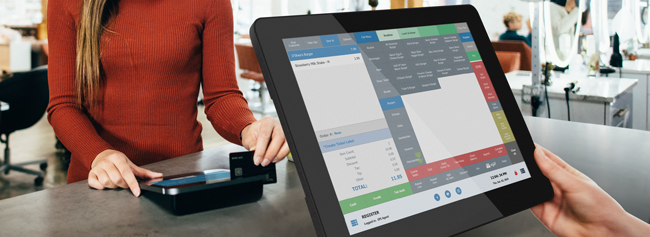
When it comes to the basics of running a small business, few tools will help you more than a point of sale (POS) system. That’s why it’s key to understand exactly what a POS is and the benefits it offers. In the article below, you’ll discover the definition of POS as well as the components that make up a system. You’ll also learn about the advantages of a POS and which POS features are important for the seamless operation and growth of your business.
POS simply stands for point of sale. It’s the place where a customer completes their transaction, such as paying for a purchase. At its most basic, a POS is comprised of hardware and software. Hardware is the electronic equipment used to perform a transaction while POS software is used to manage sales and day-to-day business operations.
An essential part of any enterprise, a point of sale is critical for many tasks beyond accepting payments. Whether it’s managing inventory, tracking employee performance, pulling sales reports, or determining the best way to market to customers, the right POS makes operating a business faster and simpler.
The hardware components of a POS system can vary based on your business needs. Typically they include a:

All-in-one terminals, like those available with Exatouch® POS, are touchscreen monitors that run POS software enabling a business to conduct transactions.

A secure place to store cash and coins that your business needs to operate.

Scanners make checkout fast and easy so you can get customers on their way quickly.

These machines enable your business to accept swipe, contactless, and EMV chip card payments.

While you may want to email customers receipts, many shoppers still prefer a printed receipt at checkout. A printed receipt also gives you a clever place to advertise upcoming sales—or even the availability of gift cards and loyalty programs.

Label printers make it easy to print shipping labels and even shelf tags when you need to update pricing on the fly. They’re also handy in printing customized name labels, ensuring customers receive their correct items.

For operations from yogurt shops and delis to craft supply stores and shipping outlets, a weight scale is an integral part of everyday business. When scales are integrated with your POS system, it ensures fast transactions and consistent, accurate pricing.
PIN pads, tablets, mobile card readers, and customer-facing displays are examples of peripherals that can be added to your POS bundle, depending on need.
Point of sale systems streamline operations by providing quick and seamless payment transactions as well as tracking critical business data. It’s a vital component to growing your business. Equipment such as barcode scanners, weight scales, and touchscreens make checkout a breeze for your customers and staff. Moreover, a POS system’s host of features and applications enable you to track sales and identify patterns over time, ensure pricing and inventory accuracy, and catch potential discrepancies. You can even monitor inventory and trends to help you avoid stock-outs, provide better customer service, and tailor marketing offers.
A POS system helps you complete business functions and provides insights that enable you to make more informed decisions. A leading point of sale can assist you with: